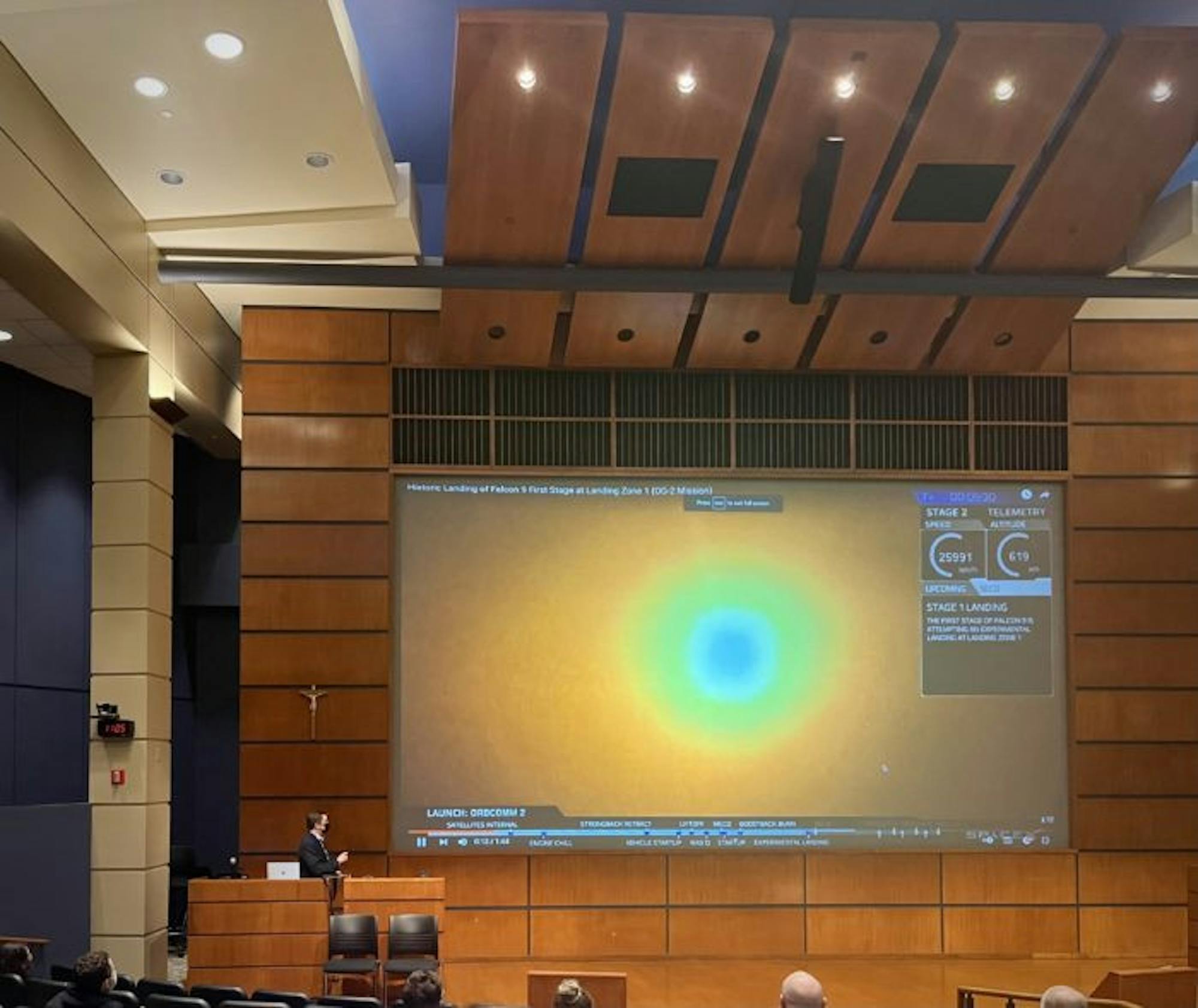With the advent of developing space companies and recent conversations surrounding the habitability of Earth, this year's “Ten Years Hence” series uncovers profound reflections not only for the business world, but for the entirety of our current generation. “Life Beyond Earth” is the theme of the 2022 lectures, offered by the Mendoza College of Business. Christian Davenport, staff writer for the Washington Post, launched the first of the seven scheduled talks by sharing insights regarding the commercialization of space. 
Author of, “The Space Barons: Jeff Bezos, Elon Musk and the Quest to Colonize the Cosmos” (2018), Davenport related how the quest for the cosmos is intricately tied to the plight of the wealthiest individuals in the world.
“The quickest way to go to space is to become a billionaire,” Davenport said. “And the richest among us are plowing big parts of their fortune into space.”
He further explained his reference to the “Space Barons” in his book’s title, “we have businesses competing in a way that governments used to,” Davenport said.
Ten Years Hence course instructor Professor James O’Rourke notes that “enlightened self-interest” is the driving force behind this new space race.
The vision of “the space barons” is similar, but unique in nature. Both Elon Musk and Jeffery Bezos plan to bridge the largest gap dividing Earth from space: costs. While Elon Musk concerns himself with a “backup for humanity,” with Mars standing as the best candidate for such an option, Bezos’ philosophy is to preserve Earth and instead move industry to space.
“When he founded Amazon, the resources he needed for the business to succeed were there: the credit card, post office and internet, for instance — of course, for space, there is no infrastructure yet,” Davenport said. “Perhaps we are dawning an era of economic dynamism that creates a whole new market, similar to what the internet did to the world when it was first created.”
Leading spectators through history, Davenport elucidated how the aura of hope for space travel now burns even brighter. He recalled the desolation of the Challenger space shuttle explosion and traced the quest to build a reusable, cost-efficient rocket, from events like the historic landing of Space X’s Falcon 9in 2015 to the Starship launch for orbit scheduled this year.
With a multiplicity of companies such as Boeing, Blue Origin and Virgin Galactic, along with the ranks of astronauts proliferating, an unprecedented era of space exploration appears to be within reach. NASA’s plans to construct a new International Space Station and their recent launching of the James Webb Space Telescope are further accomplishments which cannot be overlooked, as they will continue to enlighten the universe's great unknown.
Davenport even touched upon an eventual return to the Moon, remarking that “the reason we haven’t been beyond earth orbit for a while now is because of different, conflicting government administrations.” NASA’s Artemis project, adequately named after the mythological twin sister of Apollo, endeavors to brave through this feat once more. With the knowledge of there being water on the moon, Davenport noted there is even a potential for it to become a “gas station to space.”
Apart from the lecture, Davenport noted the importance of discussing these subjects in general, emphasizing his goal “to explain the issues of our time to people, including how the government is administering tax funded programs, and place that in a broader historical context; to inform the citizenry of this interesting time we hope to introduce in space, and how it might play a bigger role in people’s lives,” he said. “We must understand the advantages as well as the ethical challenges related to this.”
Professor O’Rourke added that the series itself is designed to encourage students to ponder about major relevant issues of the near future. In ten years, “everyone in the room will need to adapt and/or adopt an intervention strategy for the challenges and opportunities that emerge. These are topics you won't encounter in an accounting or marketing course, and you get the chance to meet interesting, important and smart people along the way.”
“Interesting people” will indeed appear throughout this series, featured among them a NASA Astronaut and U.S. Air Force test pilot, a mission manager for Blue Origin, scientist from the NASA Jet Propulsion Laboratory, and beyond. A full program for this stellar course may be found at the Mendoza College of Business website.
Read More
Trending









